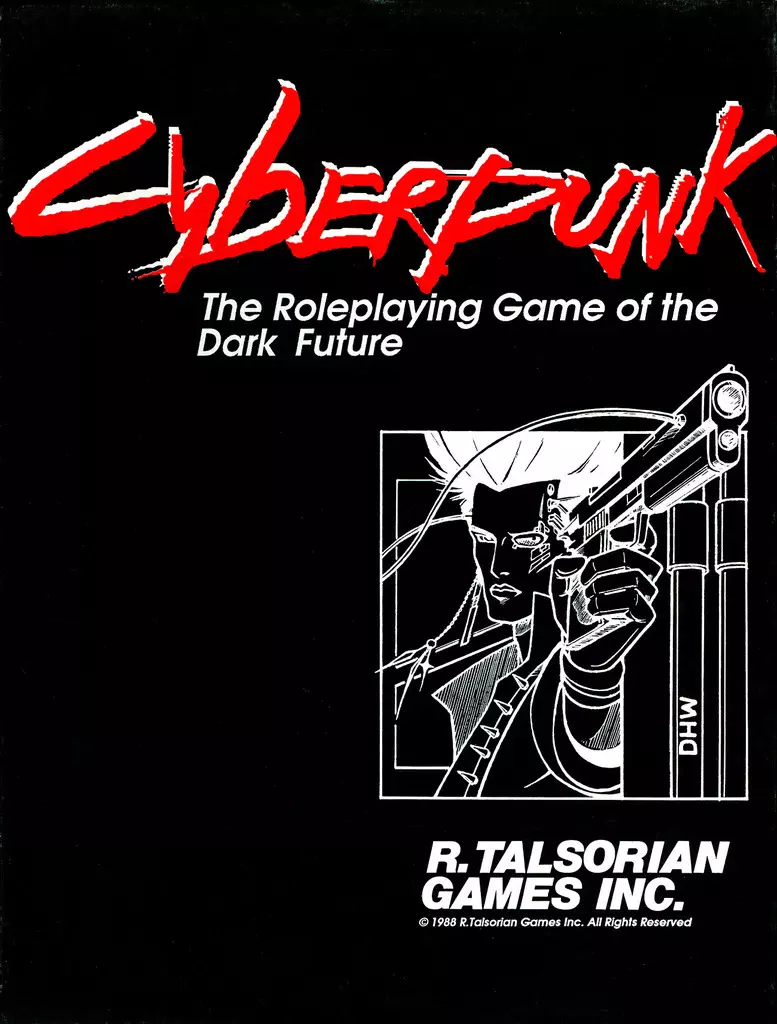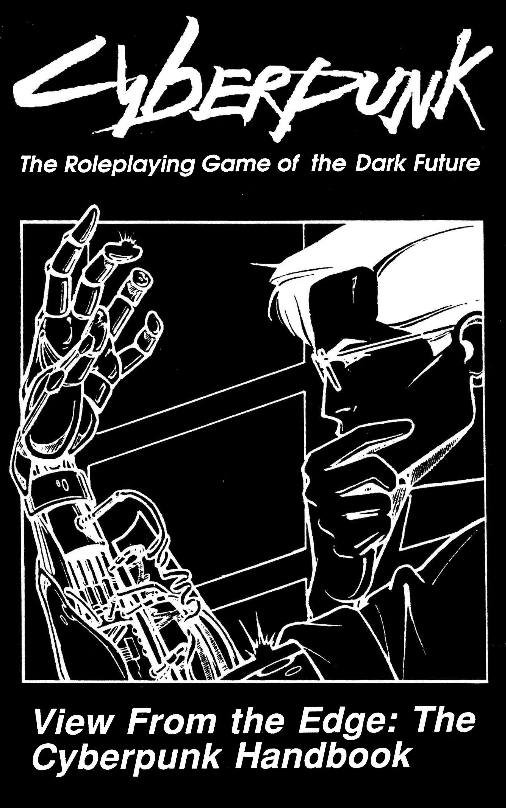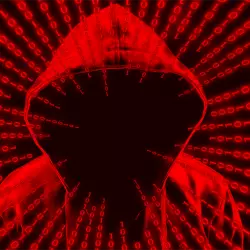It looks like the slickest open world AAA video game ever made, but have CD Projekt Red found new meaning for old cyberpunk metaphors?
Damien Walter writes on culture, politics and sci-fi for The Guardian, WIRED, BBC, Independent, Buzzfeed and Aeon magazine.
The girl in the black vinyl minidress, shit-kicker boots and neon hair braids told me she was a cyberpunk. “Wow,” I answered, shouting over the club’s thumping techno-trance beat, “I love William Gibson.” I may as well have name checked Samuel Taylor Coleridge at a Metallica gig. She stared at me for a while, then shouted back “I’m not into the Bee Gees.”
Pop culture rarely recognises its influences, especially when they are literary. But it’s a testament to just how closely attuned William Gibson’s work was to the zeitgeist, that in 1992, less than a decade after it was published, the cyberpunk ethos he imagined in fiction had migrated into reality.
Neuromancer, which celebrated the 35th anniversary of its publication this year, was one of those books I read over and over again as a teenager, tearing through Gibson’s Sprawl trilogy and the handful of short stories he had published through the early 80s in Omni magazine.
Hungry for more, I picked up the Mirrorshades anthology edited by Bruce Sterling. Despite strong stories, such as Solstice by James Patrick Kelly and Petra by Greg Bear, the truth was that none of the other writers who became associated with cyberpunk were doing what Gibson was doing.
Does sci-fi help us escape reality…or decode it?
The science fiction and fantasy novels I’d read before Neuromancer all offered shades of escapism. Going back to the SF genre after reading Gibson, I realised with disappointment that, with few exceptions, escapism was all it offered.

Gibson expressed his own discontent with the the genre of SF in his 2011 interview with the Paris Review, describing his early novels as a “dissident influence” against the genre.
I wasn’t reading William Gibson to escape reality, I was reading him because his writing was the best description I could find of the reality I was growing up in.
It wasn’t predicting the future that made Neuromancer important. It was how the novel decoded, through the metaphors of sci-fi, the complex reality of late 20th century society.
As teenagers in the 90s, feeling the early shockwaves of the high speed technological disruptions now tearing our world apart, Gibson was less a science fiction writer than a prophet. An invaluable guide to the chaos being unleashed by technology.
Gibson found the ideas for Neuromancer while watching kids playing arcade games. Not the games themselves, but the disembodied aspect of the kids starring into screens, inspired the concept of “cyberspace”, where humans live outside their bodies in abstract symbols of data.
Only a few decades later, and you’re likely reading this essay while gazing into a smartphone screen, largely unaware of your body or the world it rests in, while your consciousness moves in the abstract world of pure data we now call, not cyberspace, but the internet.
Scifi is made of metaphors.
William Gibson’s achievement was to create a set of metaphors that seemed the only accurate description for the future as seen from the 1980s.
Cyberspace for the abstract data realms of the internet. Cybernetic limbs and inset “mirrorshades” for the contempt for the flesh that abstraction would create. Sim-stim celebrities for our obsession with mediated experience. And the list goes on.
But much as I continue to love Neuromancer as a work of fiction, it’s scifi metaphors haven’t aged all that well. Reading cyberpunk today is like opening an old draw full of VHS movies and music cassette tapes from the 80s. You still remember what they’re for, but in the age of streaming and downloads, they’re long redundant metaphors for media consumption.
Which makes the shiny slick trailers for CD Project Red’s Cyberpunk 2077 more than a little interesting, especially for those of us who where there for cyberpunk the first time around, and have watched it mutate then stagnate over the decades.

Have CD Projekt Red found new use for old metaphors?
Like every other rebellious subculture from hippies to hip-hop, cyberpunk was quickly reabsorbed in to consumerism. By 1999 the imagery of cyberpunk, much of it originating from Japanese anime such as Akira and Ghost In The Shell, was so familiar that it could be recycled wholesale as a Hollywood blockbuster in The Matrix. In literature, cyberpunk was quickly ground down from a “dissident influence” to a worn-out sub-genre, as hundreds of books co-opted Gibson’s style but entirely missed his meaning.
Cyberpunk became one of a number of paint-by-numbers generic settings that a story might be set in. Epic Fantasy – elves, magic swords, dungeons. Lovecraftian Horror – mist locked American towns, mad occultists, lone investigator. Cyberpunk – grim dystopian city, cybernetic implants, mirrorshades.
As Cyberpunk became a cultural go-to for unoriginal storytellers, Gibson’s career went its own way. But in 2003’s Pattern Recognition he riffed on the cultural forces that had mutated his cyberpunk invention, as the novel’s protagonist, fashion hunter Cayce Pollard, encounters a display stand of Tommy Hilfiger.
“My God, don’t they know? This stuff is simulacra of simulacra. A diluted tincture of Ralph Lauren, who had himself diluted the glory days of Brooks Brothers, who themselves had stepped on the product of Jermyn Street and Saville Row, flavoring their ready-to-wear with liberal lashings of polo knit and regimental stripes. But Tommy surely is the null point, the black hole. There must be some Tommy Hilfiger event horizon, beyond which it is impossible to be more derivative, more removed from the source, more devoid of soul.”
Tommy Hilfiger is a billion dollar brand, and Cyberpunk 2077 is likely to be the entertainment franchise equivalent. But will it be a simulacra of simulacra? A diluted tincture of the Wachowski brothers, who had themselves stepped on Katsuhiro Otomo. Will Cyberpunk 2077 do anything original with these recycled metaphors, or will it be the event horizon of cyberpunk, beyond which it is impossible to be more devoid of soul?
The wildy popular Witcher games suggest that CD Projekt Red is quite happy to throw together a 100% generic Fantasy (capital F) setting and think not a jot about what any of these aging metaphors mean. And the shiny shiny trailers seem to suggest that they’ve done much the same with Cyberpunk 2077.
Can cyberpunk mean something real for gamers in 2020?

But. It’s possible there’s something much more interesting in the game. It’s totally possible to reinvent cyberpunk anew, even if the source material is old.
Being a cyberpunk obsessed teenager in the 90s was like living half your life in a digital mind-control experiment, as new digital media and the nascent internet claimed more and more of our attention.
Here in 2019, where screens occupy every corner of our world, I’m guessing being a teenager is like living 99.9% of your life in a digital mind control that is no longer experimental.
It was this pervasive cultural coercion that cyberpunk kicked against, whether it was through books like Neuromancer, or kids getting dressed up like goths to go to their local nightclub.
Can old cyberpunk symbols be made to mean something new for the millions, maybe even billions of gamers, who will play CD Projekt Red’s long awaited masterpiece?
It would be great if it did. Never have a generation needed subversive art to kick against the mental conditioning pumped through them by online digital media.
But something tells me CD Projekt Red aren’t in the subversion business. At least not when it comes to their bottom line.
This content was originally published here.


0 comments